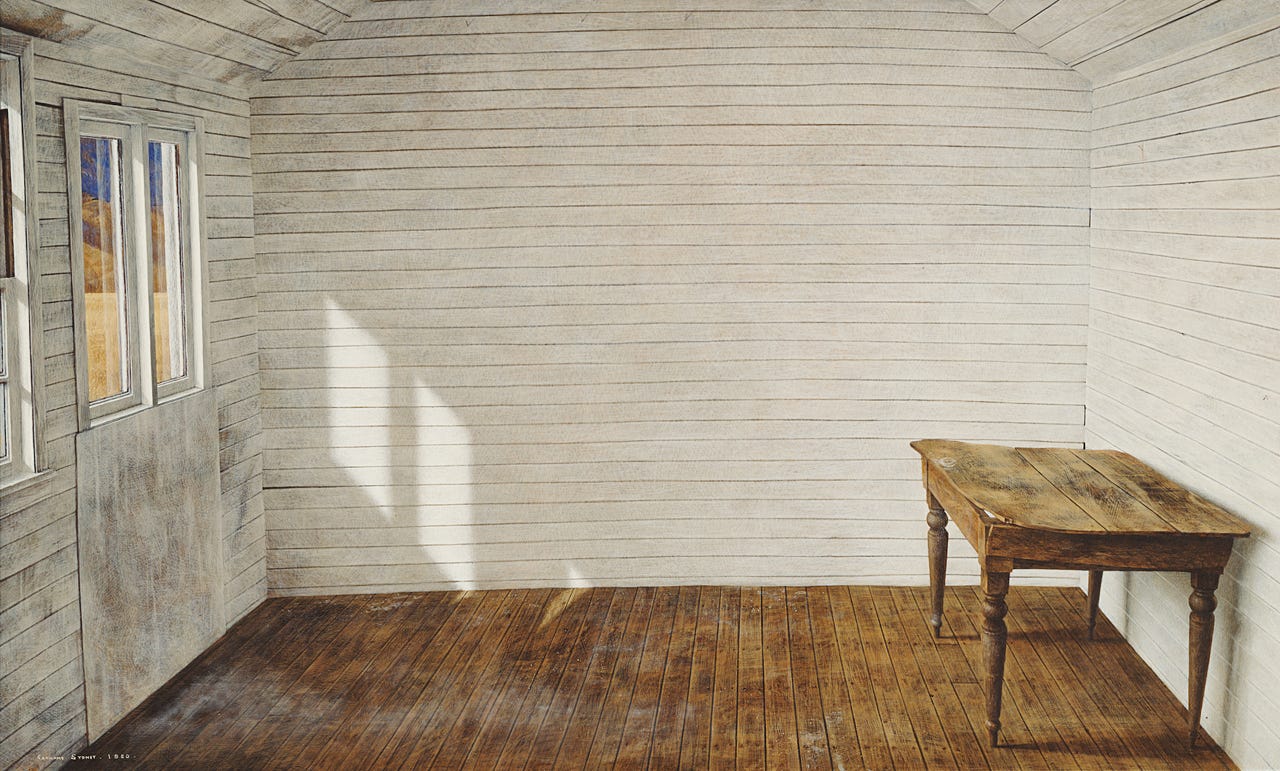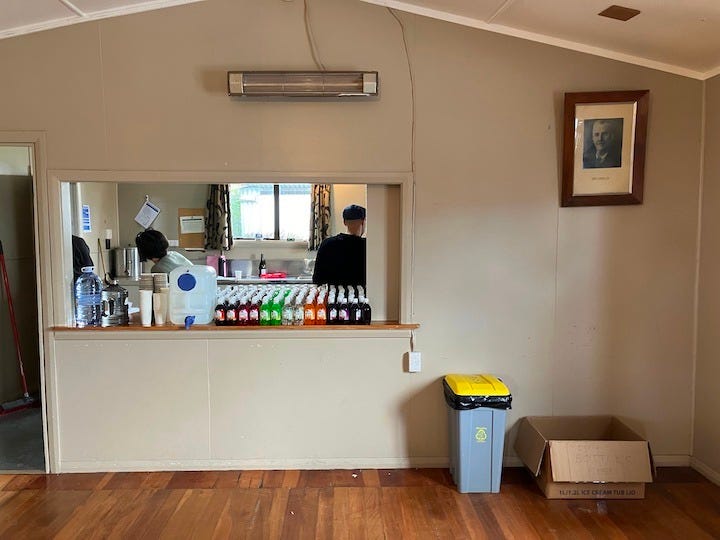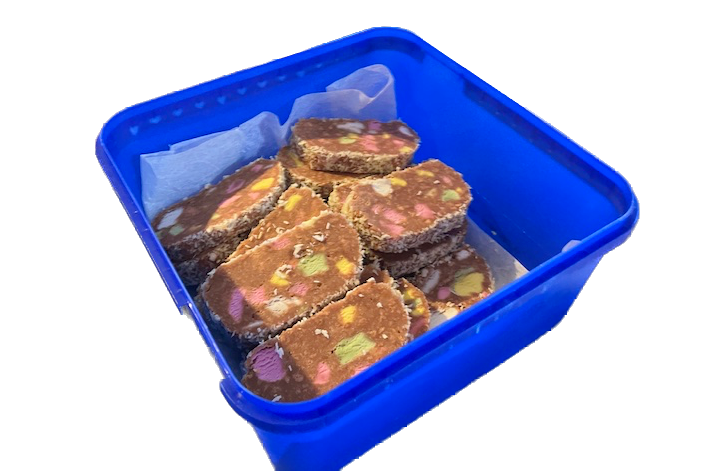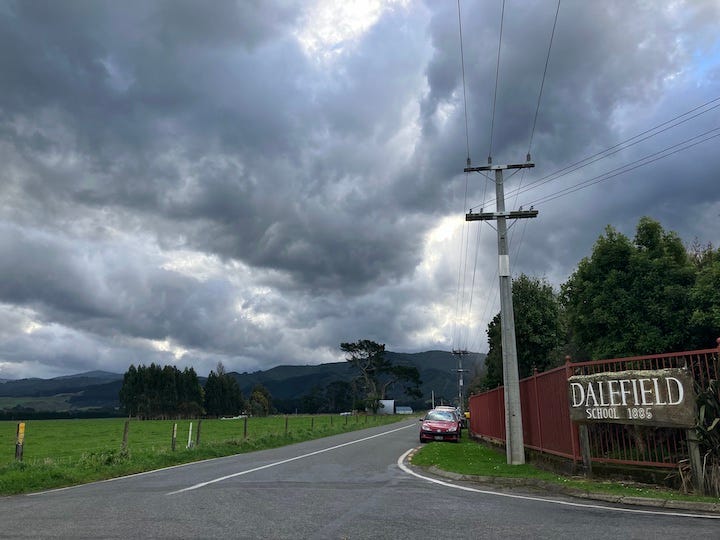The Most Kiwi Hour of My Life
On the sugar high of host-country essentialism
My son’s soccer season—sorry, football season—ended last weekend. After the final games he and I attended a lovely awards ceremony for all the many teams in the Carterton Junior Football Club. Parents and kids packed into Dalefield Hall, a plain rectangle of corrugated tin wedged between sheep paddocks and a tiny rural school in the shadow of the Tararua range. Took us over an hour, but we assembled families doggedly feted a dozen or more teams of 8-and-unders in turn: sweet words from proud coaches, certificates, most-improved trophies, fistfuls of lollies for the kids. There were no win-loss records read out, no champion named. Afterwards, a potluck: sausage rolls, pizza cut into community-sharing slivers, a squeezy bottle of Wattie’s. I ate too much lolly cake and made small talk about a friend’s new job in Australia. Out the open door a maybe-jacket breeze came off the mountains. My son and a buddy ran off to the schoolyard to climb a totara tree. Rain threatened, began, was roundly ignored, then wandered west to the sea. It was, quietly, the most Kiwi hour of my life.
But this is a ridiculous claim. In her viral New Yorker essay “The Case Against Travel,” the philosopher Agnes Callard argued that tourism reduces the traveler to a spectator, locals to a show. “I was trying to see the Frenchness in the French people around me,” she writes of her own trip to Paris. “This is not a way to make friends.” C’est moi, I fear.
And yet we have made friends here, Jenny and I. Had friends in Dalefield Hall that day, in fact. Turns out you can make local friends and still fall prey, on the odd spring Saturday, to the narcotic rush of host-country essentialism. The notebook comes out. The mouth goes dry. Any random set of local data points becomes a constellation of national identity. My son’s up there beaming as he collects his participation medal, and I’m scribbling in the kitchen doorway and patting myself on the back. I see this country, mate. Gimme lollies.
First, the corrections. My Dalefield Hall swoon mistakenly scored New Zealand as entirely rural and largely Pākehā (white), which, as it happens, are two connotations the term Kiwi tends to carry. Dalefield Hall is an old settler meeting house; the local marae, or Māori meeting house, was just a few clicks away across the valley. (In real NZ news this week, the Maori King passed away and his daughter, the 27-year-old Te Puhi Ariki Ngawai Hono i te Po Paki, has been named the new Queen.) The football banquet crowd was largely Pākehā, with some Māori—the line between the two here is often admirably blurry—but included little to none of the Asian and Pasifika populations that make NZ cities so diverse. And what about Carterton kids who don’t play sport, as they call it here? I suppose it’s true that NZ is relatively white, rural, and sporty, as countries go. But this is a broad simplification, a myth not unlike the America worshipped by Pākehā boomers in Route 66 t-shirts who drive their classic left-hand-drive Chevys around the valley on sunny Sundays. A colleague who read early drafts of these letters warned me of the trap: “My New Zealand,” she said, “is queer house parties in Newtown.”
And yet! I want so badly to declare my afternoon in Dalefield Hall an essential New Zealand experience. I’ve had the feeling at similar events before: here is the sparsely decorated hall, here is the ritual meal of simple food, here are the barefoot kids running free.
When that essentialism hits it’s hard to stop. Look at that spread: Salt and vinegar chips! Raspberry slices! Lamingtons, the fancy kind with a dollop of cream in the middle! One family brought their dish in an old Tip Top Ice Cream tub, the same Boysenberry Ripple flavor in our own freezer. Step back from the folding tables and the hall itself is about five different Grahame Sydney paintings (Americans: think a latter-day South Island disciple of Hopper and Wyeth, all weathered siding and lonesome light.) The wooden floor, time-worn and honey gold—please let it be rimu! Gumboots on feet. Gumboots left muddy by the door. A workie dad in high-viz orange. The hall’s lone decorations were ancient commemorative plaques crowded with hand-painted English and Scottish names: DALEFIELD MENS HOCKEY CLUB FORMED 1909 and FOR KING & COUNTRY SERVICES RENDERED, with golden stars by the boys who didn’t make it home. I made small talk about a kid who’d fallen off the school’s new playground equipment and landed straight on his head—but he’s fine, kids are so resilient aye. Tacked to the kitchen wall was a yellowed council notice declaring the hall officially Earthquake Damaged and listing repairs to be completed within five years or else the hall would be demolished. The notice was dated 2016. The meal began and the Tip Top tub was opened to reveal the potluck’s third lolly cake in a pile of sticky slices. Just use your fingers. There are never any forks.
Are the details hitting yet? I’ve got loads more. Kiwis, have I seen the New Zealander in you? My fellow Americans, are you transported across the sea?
The potluck wound down and my mania, too, faded like a sugar rush. Do forks even matter? Do nations? Locals don’t take notes, cowboy. And lolly cake is actually kind of gross.
When the essentialism is gone it’s hard to remember just what set it off in the first place. We’d arrived at the hall a few minutes late—I have yet to figure out when NZ runs on a strict schedule, and when it’s She’ll Be Right. The door was open. The long, narrow hall was full as a church on Easter. Dads stood around in the back, as we do. The club secretary was already speaking. I didn’t know the play here. Camp in the doorway or push on into the hall and search for an open seat? What would a Kiwi do?

My son, meanwhile, strode confidently over the threshold and into the thicket of strange dads.
Quietly, clearly, a father in the doorway called my son’s name.
I know the man only through school pickups. His own son didn’t even play on our team. He didn’t ask my boy where his parents were, or treat him as an advance family scout and look around for the adult. He just leaned down and in the kindest voice directed my son to find his teammates among the kids sitting on the floor up at the front. My son walked away down the long aisle without looking back.
Was that Kiwi thing? A small town thing? Would the dads do it back home, amid all the legalistic permissions of American life?
I don’t know. I’ve never raised kids there.







The only thing you got wrong in this very entertaining letter is that lolly cake is gross.
Otherwise, loved it!
This was great! Welcome back. Let's hang out at Vogelmorn soon - splits the difference between NZ community hall and queer house party. I love the way you see all this as ritual